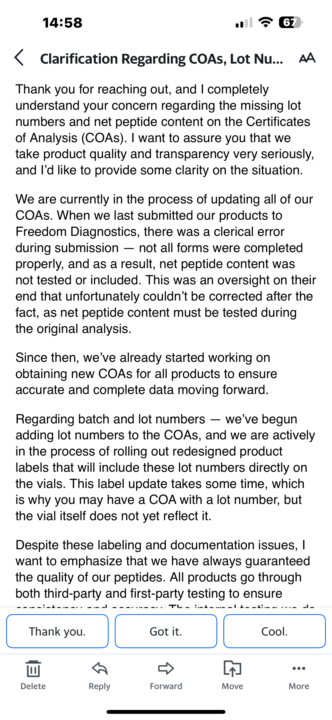Activity
Mon
Wed
Fri
Sun
Nov
Dec
Jan
Feb
Mar
Apr
May
Jun
Jul
Aug
Sep
Oct
What is this?
Less
More
Memberships
Heather's Peppy Steps
421 members • Free
Peptira
94 members • Free
Mile High Compounds Rat Pack
732 members • Free
Exploring Peptides Community
7.3k members • Free
Peptide Price
5.8k members • Free
Peptides4Power
359 members • Free
Trading For Women
3.8k members • $35/m
9 contributions to Peptide Price
NAD+/Carnitine Amino Blend: Modern Aminos Stack Explained
I am going to start a series of breaking down all the interesting amino blends from the companies listed on peptideprice.store. Let's start with NAD+/Carnitine Amino Blend I was interested in this one and wanted to break it down for anyone researching in a cutting phase👇 What's Actually In This Thing? L-Carnitine (250mg/ml) - The Heavy Hitter This is dosed the highest for a reason. Carnitine literally shuttles fat into your mitochondria where it gets burned for energy. When you're in a deficit, this helps your body actually USE that stored fat. It's the Uber driver taking fat to the incinerator. NAD+ (20mg/ml) - The Energy Hack Your NAD+ levels tank when you're dieting hard. This stuff keeps your cellular energy production firing on all cylinders when you're running on less food. Less fatigue = better training = better results. The MIC Stack (Methionine/Inositol/Choline) - Methionine: Prevents fat buildup in your liver - Inositol: Helps insulin sensitivity + fat metabolism - Choline: Moves fat around instead of storing it Think of these as your liver's cleanup crew while it's processing all that mobilized fat. B12 (500mcg/ml) + B6 (25mg/ml) Energy and metabolism support. B12 especially - most people are low anyway, and it's crucial when you're trying to burn fat efficiently. Researching Protocol Typical research dosing: 0.5ml -1ml per injection (low and slow to start) Frequency: 1-3x per week (Monday/Wednesday/Friday is common) Route: Usually intramuscular (IM) due to L-Carnitine Why This Works For Fat Loss When you're cutting, you need your body to: ✅ Actually access stored fat ✅ Burn it efficiently ✅ Keep energy up despite less food ✅ Support liver function (it's working overtime) ✅ Preserve muscle while losing fat This blend hits all those targets. Real talk: This isn't magic. You still need to be in a calorie deficit and training hard. But it's solid metabolic support to make the process more efficient and less miserable.

AIO peptides
Called out AIO regarding their COAs. This is what they sent me! Let’s wait and see!!!!

AIO Peptides Another Shady Vendor
This is why I do the vetting process to prevent shady vendors, the least I they could do is make sure the peptide content matches up. Stay safe out there!

Struggling With Energy Levels on A GLP-1
If you're someone who's already battling fatigue throughout the day, and GLP-1s are making it even worse, you're not alone. Let's talk about what's actually happening and some cutting-edge solutions being researched. Why GLPs Can Make Fatigue Worse GLP-1 medications slow gastric emptying and reduce caloric intake significantly. When you're already running on fumes, this can create a perfect storm: reduced nutrient absorption, lower energy availability, and metabolic adaptation that leaves you dragging even more. Research-Backed Options to Consider MOTS-c (Mitochondrial-Derived Peptide) This 16-amino acid peptide is naturally produced in your mitochondria and acts as a metabolic regulator. Research shows it: - Enhances mitochondrial function and energy production - Improves insulin sensitivity - Supports metabolic flexibility during caloric restriction - May help counteract age-related mitochondrial decline The key: MOTS-c could help your cells produce energy more efficiently, even when calories are restricted. 5-Amino-1MQ This small molecule works by inhibiting NNMT (nicotinamide N-methyltransferase), which: - Increases NAD+ availability at the cellular level - Supports fat metabolism and energy production - May improve metabolic rate during weight loss - Helps preserve lean muscle mass Why it matters: When you're on GLPs and eating less, maintaining metabolic efficiency is crucial. NAD+ Supplementation/IV Therapy NAD+ (nicotinamide adenine dinucleotide) is essential for cellular energy production: - Required for mitochondrial ATP synthesis - Declines naturally with age and caloric restriction - Critical for metabolic processes and DNA repair - Can be supplemented via sublingual, IV, or precursors (NMN, NR) The catch: Direct NAD+ supplementation may have better bioavailability than precursors for acute fatigue. SS-31 (Elamipretide) This mitochondria-targeting peptide is one of the most promising for fatigue: - Specifically targets and repairs damaged mitochondria - Improves mitochondrial efficiency and reduces oxidative stress - Enhances cellular energy production - Shows promise in clinical trials for fatigue-related conditions

Condensation?
Today I noticed that my Nad and Glut that’s in fridge has condensation in it.. Does that mean it’s bad? Do I add a silica pack to the container - will that help? Thoughts?
1-9 of 9



